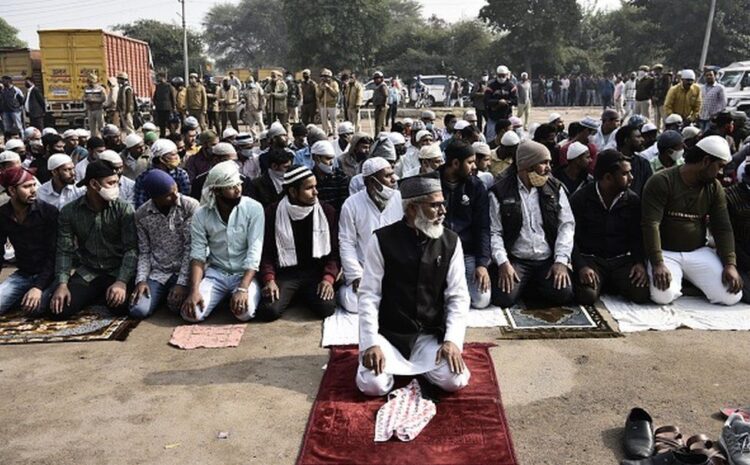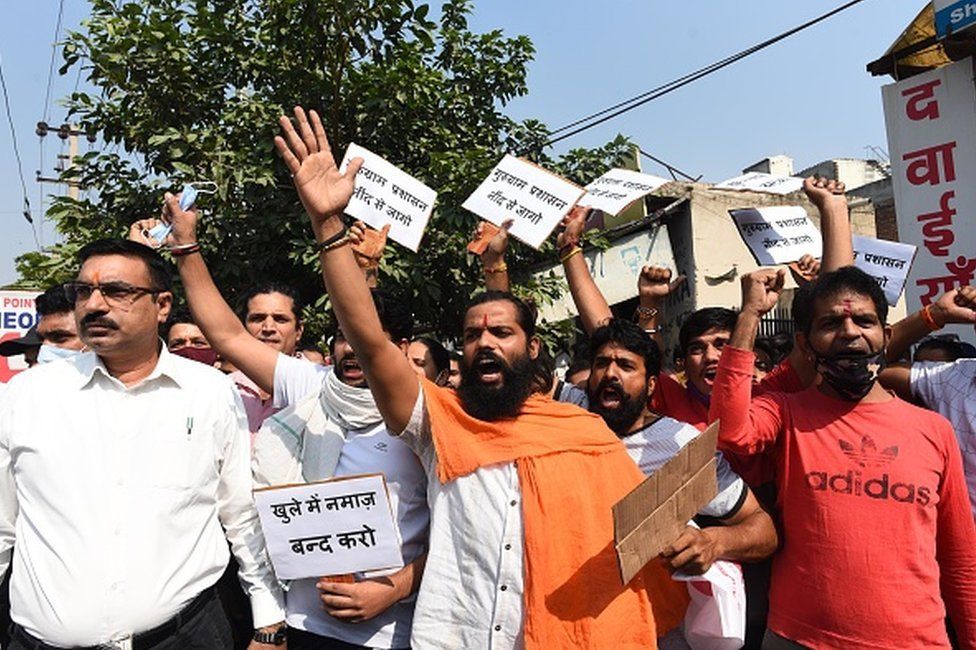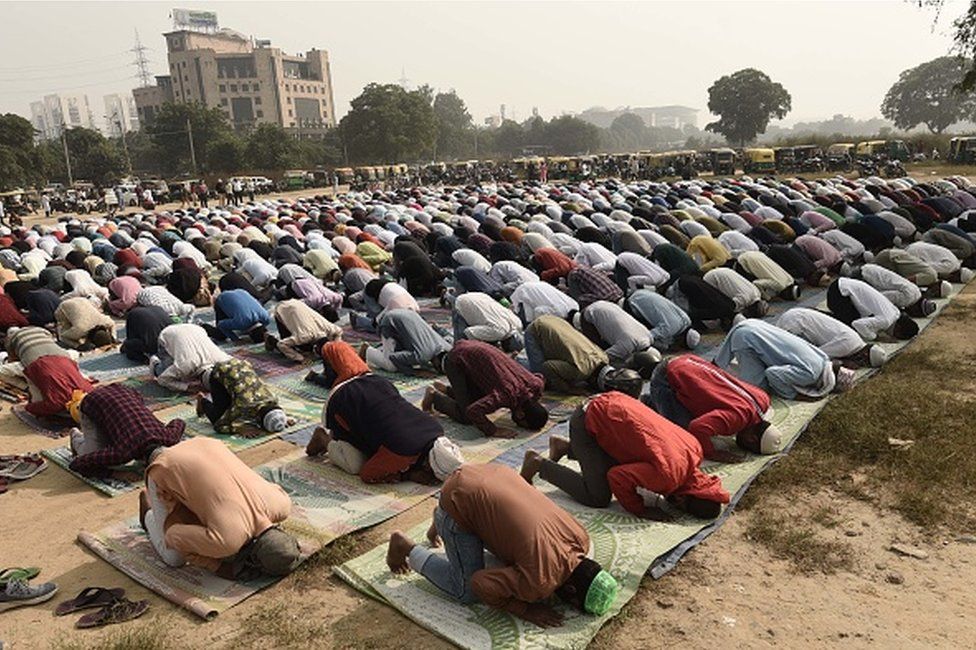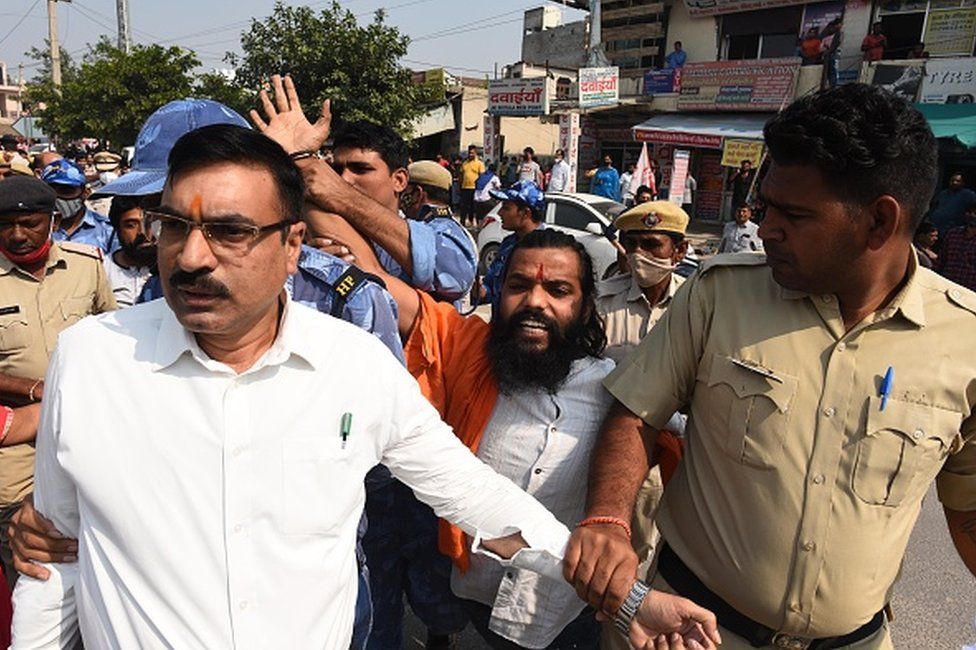
IMAGE SOURCE, GETTY IMAGES Image caption, Muslim worshippers are offering prayers under police protection in Gurgaon

Soutik Biswas
India correspondent
They have noisily demanded that open prayers should be stopped in these vacant spaces – cark parks, government-owned plots of land near factories, markets, and residential neighbourhoods – where working class Muslims have offered prayers for years.
They have shouted slogans, parked vehicles to block entry, and heckled the worshippers, calling them jihadis and Pakistanis. The prayers are now held under police protection. “It’s a scary situation. We never expected this to happen in Gurgaon,” says Altaf Ahmad, co-founder of the Gurgaon Muslim Council, a local community group.
Located some 15 miles south of Delhi, parts of Gurgaon have grown from a cluster of sleepy villages to a thriving business suburb in less than three decades. Filled to the brim with gleaming glass-and-chrome office towers, luxury shops and swish high-rise apartments, this “millennium city” – as officials love to call it – of more than a million people is a haven for both white and blue collar migrants. By one estimate, up to 500,000 Muslims, mainly construction workers, handymen and menial labour, live here.
But Gurgaon today is the unlikely centre of a new religious fault-line over namaz or prayers.
“We are not against Muslims or namaz. But holding prayers in [the] open is ‘land jihad’,” says Kulbhushan Bhardwaj, one of the leaders of the protesting Hindu groups. Muslim leaders say this is the latest bogey about “Muslims planning to grab lands” where they pray.
 IMAGE SOURCE, GETTY IMAGES
IMAGE SOURCE, GETTY IMAGESThe protesters claim they are part of an umbrella group of some two dozen Hindu nationalist outfits – mainly vigilante gangs made up of young, unemployed men – called the Sanyukt Hindu Sangharsh Samiti. The Bharatiya Janata Party (BJP), which has governed India since 2014, has “traditionally protected” Hindu nationalist vigilantes, whose “moral and social policing” is intended to “impose cultural and social practices rather than laws”, according to Christophe Jaffrelot, a political scientist.
But what began as a rag-tag army of protesters in Gurgaon has slowly coalesced into an organised movement, now drawing the support of some local residents. “We don’t feel good when Muslims pray openly near my house. We feel fear. After prayers, they loiter around,” said Sunil Yadav, a resident who joined a successful protest to stop prayers on a 36-acre plot near his home.
Last week, the protests gained the imprimatur of legitimacy when the chief minister of BJP-led Haryana – where Gurgaon is located – denounced open prayers. Manohar Lal Khattar said namaz offered in [the] open would “not be tolerated”. He said the practice was a “confrontation, we will not allow this confrontation to continue”.
The early protests over open prayers began in 2018. After negotiations, Muslim citizen groups had then agreed to whittle down the number of sites from 108 to 37. This year, the protests restarted for reasons that are still unclear. After fresh – and contested – negotiations, the number of sites is now down to 20.
Muslims have been offering prayers in the open in Gurgaon for more than two decades. At the heart of the dispute is the shortage of spaces to accommodate worshippers.
 IMAGE SOURCE, GETTY IMAGES
IMAGE SOURCE, GETTY IMAGES“They [vigilantes] are using a civic problem to stoke religious tensions,” says Hilal Ahmed, a scholar of political Islam. “They are telling Muslims to go to mosques and pray. The problem is that there aren’t enough mosques.”
There are some 13 mosques in Gurgaon, of which only one is located in the newer part of the city, where most migrants live and work. Jamaluddin, a local officer of a board which oversees Muslim properties, says most of their land is locked away in the far-flung outskirts with a negligible Muslim population – 19 mosques in such areas were closed “because of lack of worshippers”, he said. And land in the heart of Gurgaon was unaffordable for the board.
Gurgaon’s town planners have allocated space for more than 42 temples and 18 gurdwaras but just one plot for a mosque in the newly developed parts of the city, according to the Gurgaon Muslim Council. Five years ago, two Muslim trusts failed in their bid to acquire government plots being sold for religious purposes.
What is happening in Gurgaon today has echoes of a 2011 ban on offering prayers in the street in Paris after protests from the far right. The reason: Muslims were unable to find space in mosques. An agreement was subsequently reached with two local mosques to rent out disused barracks for prayers. Six years later there was a similar protest by politicians in a Paris suburb – worshippers said they had nowhere else to go since the town hall took over the room they used for prayers.
 IMAGE SOURCE, GETTY IMAGES
IMAGE SOURCE, GETTY IMAGESBut religion always has and still does spill into public spaces in India – annual religious processions and gatherings often obstruct traffic and even force road closures. India’s chaotic, pluralist brand of secularism has however come under threat in recent years.
Yet, in Gurgaon, all may not be lost. A Hindu businessman opened his shop to Muslims to offer Friday prayers. Last month, Sikh gurdwaras offered their space to Muslims for worship, but had to reverse the decision after protests from Hindu groups. Most Indians say it’s important to respect all faiths to be “truly Indian”, according to a major new Pew Research Center survey of religion across India.
